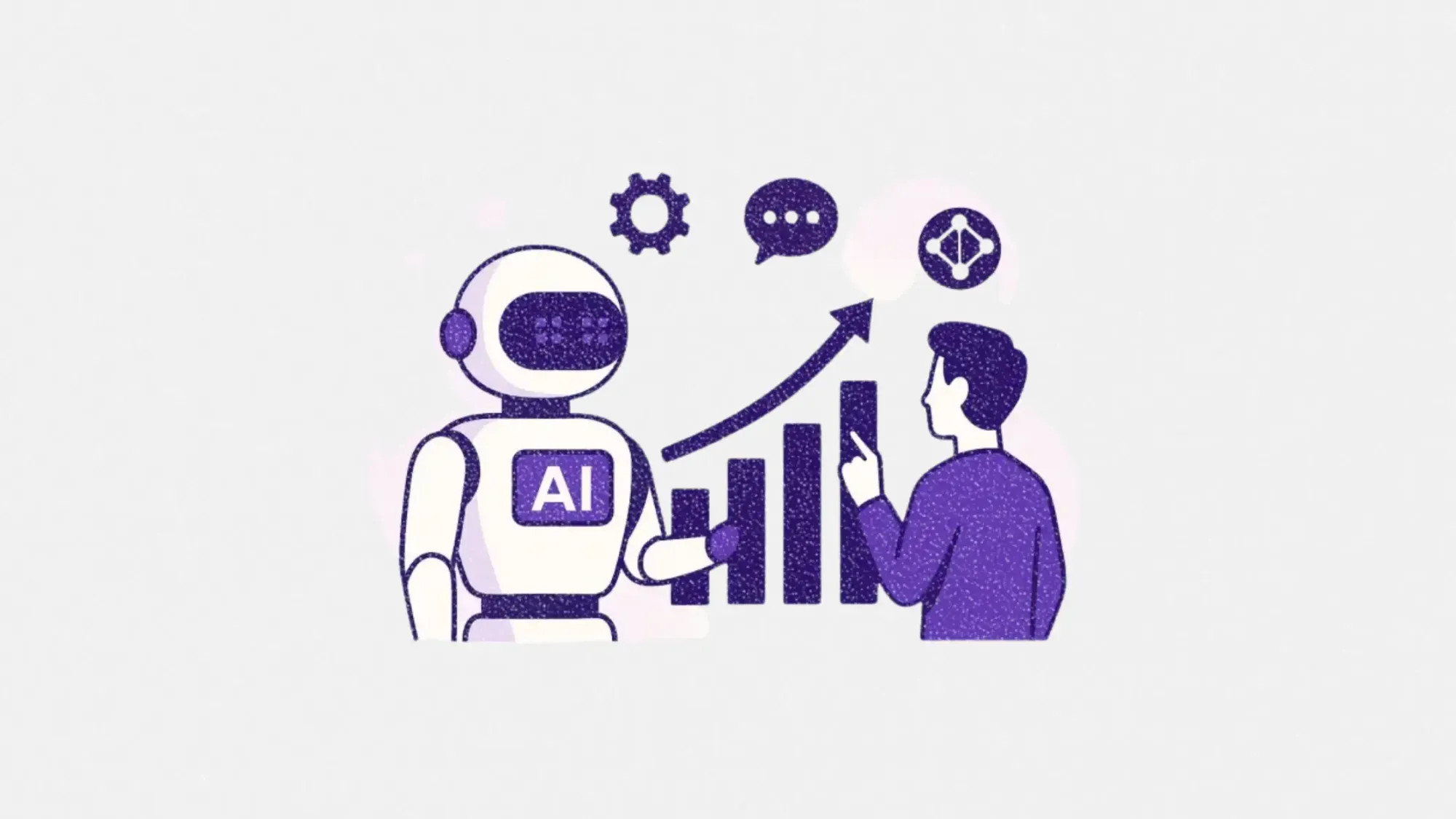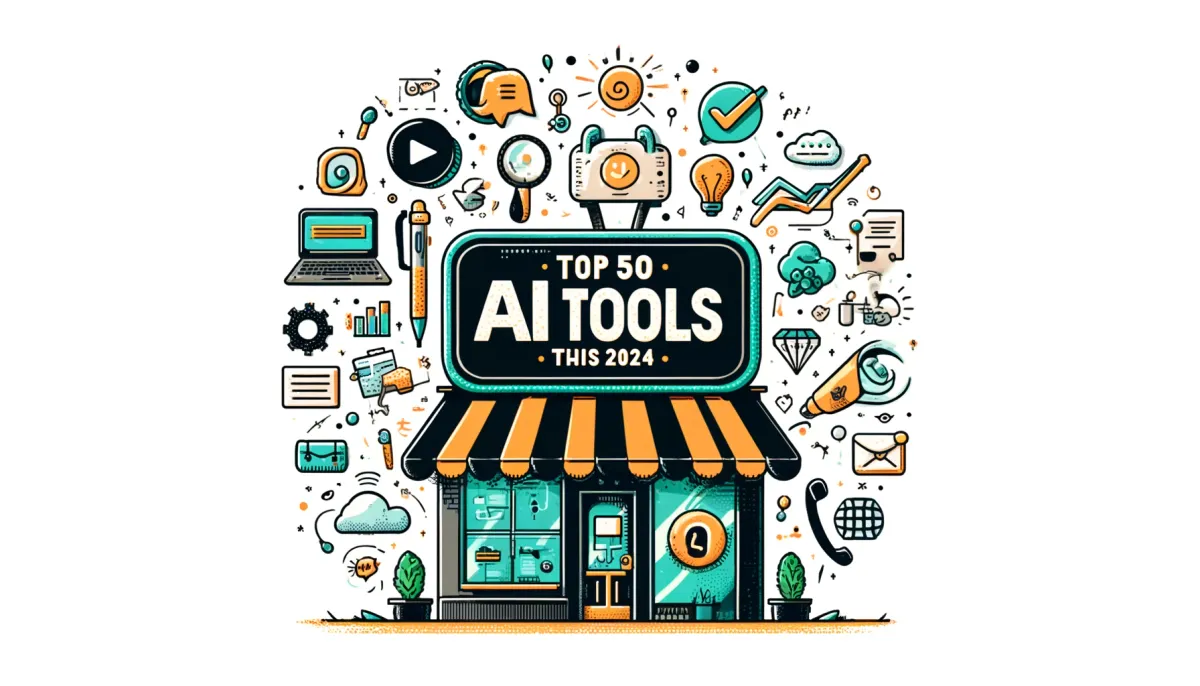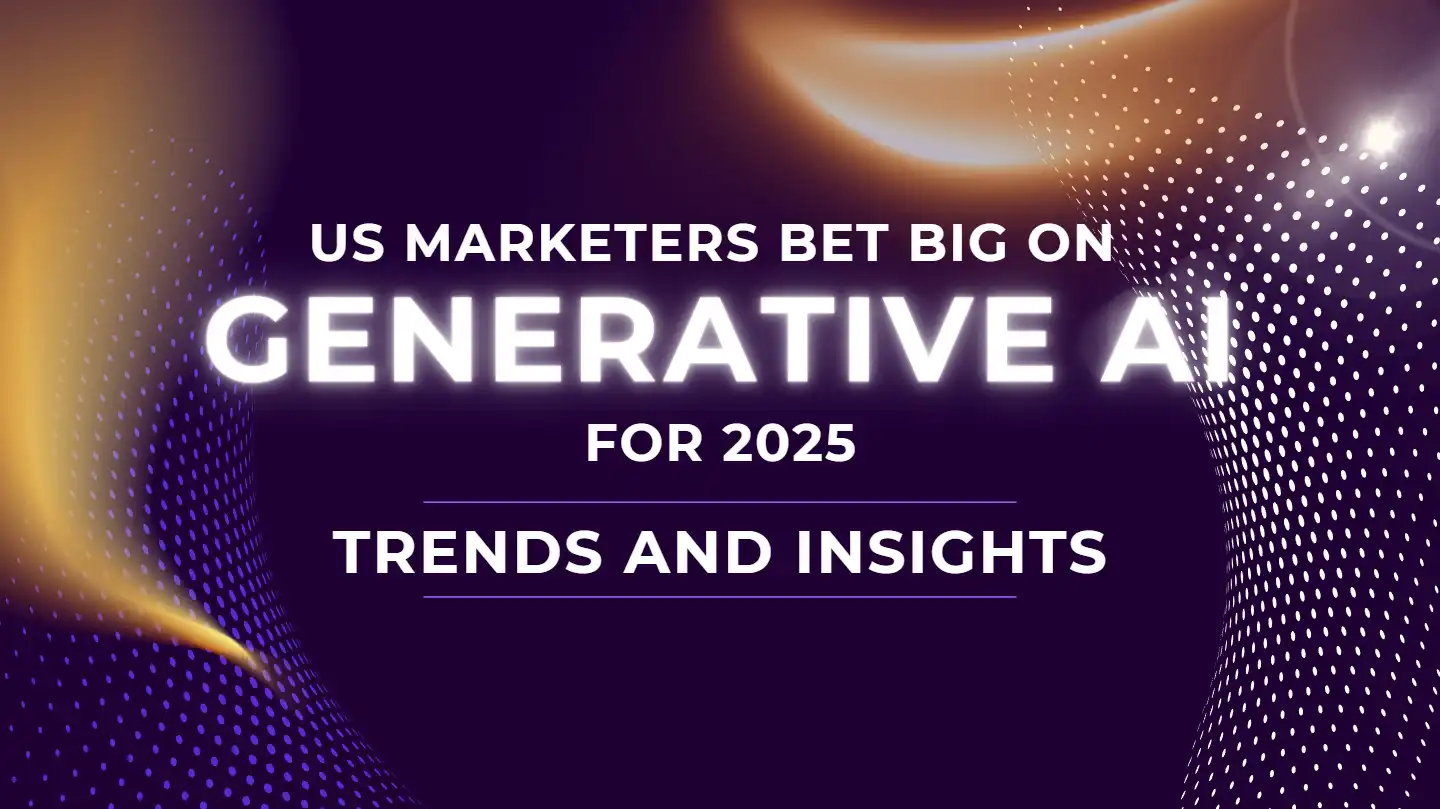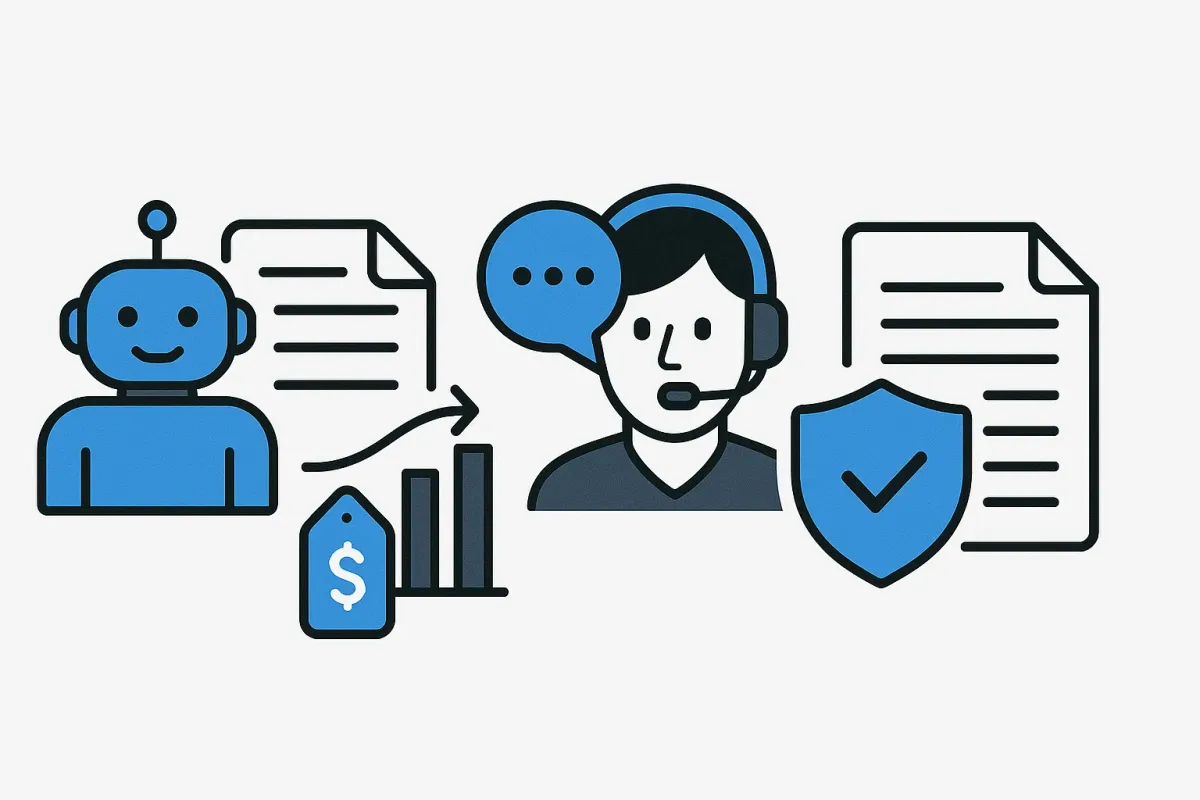The future of AI in marketing 2026: trends, tools and strategies
Discover AI marketing's future in 2026 with predictions on automation, personalization, decision-making, emerging tech, and ethical challenges.

The marketing landscape is changing dramatically as AI technologies continue to accelerate. Now AI is no longer just an advantage, it is an essential survival tool. Global AI marketing revenue is projected to exceed US$107.5 billion by 2028, with 69.1% of marketers already integrating AI into their operations. Nearly a quarter of businesses spend more than 10% of their marketing budgets on AI visibility, and almost half plan to increase that within the next year.
But the real disruption goes deeper. As AI search platforms like ChatGPT, Claude, and Google’s AI Overviews change how people find content, traditional search engines like Google are slowly getting left behind. Today, if your brand is not mentioned in trusted media sources, AI search may overlook you entirely.
In this article, we’ll explore what’s ahead in AI marketing, the tools and trends that matter, and how to stay competitive in a world where automation, personalization, and brand trust intersect.
Short on time?
Here is a table of contents for quick access:
- AI marketing trends to expect in 2026
- Emerging AI technologies in marketing
- Why PR matters more in the AI search era
- What marketers should know
- Top AI tools for marketing teams in 2026
- Ethical considerations in AI marketing
- FAQs about AI marketing
- Looking for more insights into the future of AI?

AI marketing trends to expect in 2026
In just a year, AI in marketing has moved from automated assistance to autonomous action. 2025 was the year marketers learned to scale personalization, content creation, and analytics with tools like ChatGPT and Jasper. But 2026 marks a deeper shift — the rise of agentic AI, where systems act on goals rather than prompts.
Instead of manually instructing an AI to write, segment, or optimize, marketers are now letting intelligent agents plan and execute multi-step campaigns on their own. The result is faster execution, smarter personalization, and round-the-clock optimization powered by integrated data ecosystems.
The future of AI in marketing will be shaped by major advancements in automation, personalization, and decision-making. Here are the key trends to expect by 2026:
1. AI automation becomes standard
AI is now central to automating routine tasks, freeing teams for higher-level strategy. Marketers report strong gains: 83% see increased efficiency, nearly half save 1–5 hours weekly, and 84% say it speeds up quality content delivery.
Similarly, LEAFIO AI Inventory optimization solution is helping retailers automate stock management processes, reducing manual forecasting work while increasing inventory turnover rates and minimizing excess stock situations.
2. Personalization evolves into hyper-relevance
AI is moving beyond personalization into predictive anticipation, with platforms like Jasper.ai already adapting content in real time based on user interactions and campaign goals. The payoff is clear: 91% of consumers prefer brands that personalize, and AI engines have driven a 35% increase in purchase frequency and a 21% boost in order value.
3. AI-powered decision-making goes mainstream
Tools like ClickUp AI help teams visualize data and generate automated reports. AI analytics now improve decision-making speed by 78% and forecasting accuracy by 47%, driving smarter budgets and campaign planning. Data-backed decisions are no longer a competitive edge—they’re the default.
4. Ethics and AI governance rise in priority
AI unlocks scale, but without ethics, it risks brand trust. With 127 countries passing AI-related laws and 40% of marketers citing data privacy as their top barrier, compliance and transparency are now essentials—not options.
5. AI integrations will significantly impact the workforce
AI is reframing roles into hybrid functions where marketers co-create with algorithms, test faster, and iterate more deeply. Yet 59.8% of marketers worry about job loss (up from 35.6% in 2023).
McKinsey predicts 30% of work hours could be automated by 2030, but also 97 million new roles may emerge—making training to work with AI the real priority.
6. Multimodal content marketing becomes the norm
Text, image, voice, and video are converging. Generative AI tools are producing brand narratives across all formats at once — from short-form videos to podcast scripts and product imagery.
Google’s continued rollout of AI Overviews and multimodal search also means marketers must rethink SEO. The priority now is Generative Engine Optimization (GEO) — ensuring your brand’s content is structured and trustworthy enough to be cited by AI-powered search systems.
7. AI in the supermarket
FairPrice in Singapore has partnered with Google Cloud to embed agentic AI across its retail chain, using platforms like Vertex AI, Gemini API, and Imagen 4. The first pilot at FairPrice Finest Punggol integrates AI assistants into carts, shelves, and pharmacy zones, with more locations to follow. This shows how AI in 2026 is moving beyond dashboards into retail spaces, blending digital intelligence with in-store shopping.

Emerging AI technologies in marketing
AI isn’t just improving existing workflows—it’s enabling completely new ones.
1. Predictive customer insights
Deep learning is pushing predictive analytics to new heights. Brands can now anticipate user behavior with precision, using tools like Salesforce and Adobe to orchestrate smarter journeys and optimize conversion paths.
2. Generative AI for branded content
Generative AI is set to transform content creation in marketing by 2026—delivering assets faster, cheaper, and with greater brand alignment. Tools like GPT-4 and Synthesia can already write in your brand voice, adapt content to different channels, and scale production effortlessly.
But its value goes beyond execution—AI is becoming a creative partner, too. Platforms like WPP Open now include features such as “Unspoken Truths” and “Shower Thoughts”, helping marketers uncover hidden insights and spark fresh campaign ideas.

3. AI-enhanced programmatic advertising
One area experiencing rapid transformation is programmatic advertising, where AI-driven ad exchange for publishers is playing a pivotal role. These exchanges use real-time bidding and intelligent algorithms to optimize ad placements and revenue generation.
For publishers, leveraging AI-powered ad exchanges means improved fill rates, higher CPMs, and more relevant ads for users—all without manual intervention. Companies like The Trade Desk are using AI to deliver smarter, more dynamic ad placements through real-time data analysis and creative optimization.
4. Sentiment analysis with emotional depth
Sentiment analysis technology is evolving rapidly, with new AI models and tools like Clarabridge or Brandwatch that are capable of understanding and interpreting human emotions more accurately. By 2026, marketers will leverage these advancements to gain deeper insights into customer sentiments across various channels, including social media, reviews, and customer service interactions.
5. AI-powered hyper-personalization
Hyper-personalization, driven by emerging AI technologies, will take personalized marketing to the next level. Expect real-time, multi-channel personalization thanks to tools like Dynamic Yield and Persado that integrate behavioral and transactional data.
6. Augmented reality (AR) powered by AI
The integration of AI with augmented reality (AR) is another emerging trend set to impact marketing significantly. AI-enhanced AR experiences will provide customers with interactive and immersive ways to engage with products and brands.
Snap Inc. and Shopify are developing AI-enhanced AR features, such as personalized virtual try-ons, adaptive in-store experiences and contextual overlays.
7. Agentic AI: the rise of autonomous collaboration
AI agents are evolving into autonomous collaborators, managing campaigns end-to-end. Tools like Omneky already launch and optimize omnichannel ads, while Adobe enables real-time tailoring based on user behavior. Emerging systems like Anthropic’s MCP and Google’s A2A support agent-to-agent collaboration—but autonomy also raises new concerns about trust and control.
Salesforce’s Agentforce 360, for instance, is transforming marketing workflows by connecting CRM data, predictive insights, and autonomous campaign orchestration. Similarly, PepsiCo has announced an agentic AI-first strategy where internal agentic systems oversee media buying, creative optimization, and demand forecasting.
Marketers now focus less on prompts — and more on setting clear objectives that agentic systems can pursue across multiple tools.

8. AI visibility optimization for search (Generative Engine Optimization or GEO)
With generative AI platforms like ChatGPT and Claude influencing how people access content, a new discipline is emerging: Generative Engine Optimization (GEO).
Marketers must now optimize not just for traditional search, but for AI engines that summarize and recommend content. This means reevaluating SEO strategies through the lens of AI discoverability—something that companies like Peec AI are helping make possible.
9. AI-powered voice search and synthetic voices
More consumers are interacting with brands through voice—whether it's Alexa, Siri, or branded voicebots. AI tools now enable dynamic, human-like speech generation.
Tools like WellSaid Labs or ElevenLabs make it easy to create brand-aligned voices for ads, content, or customer support. In 2026, optimizing for voice responses and voice search is crucial, especially as generative AI integrates more with voice assistants.
10. AI-powered video editing and content repurposing
Marketers are now using AI to turn long-form videos into bite-sized, platform-ready clips with minimal effort.
Tools like Pictory and KLAP use AI to detect highlights, insert subtitles, and tailor visuals for YouTube Shorts, TikTok, and Instagram Reels. This supports a more agile content strategy without expanding headcount.

Why PR matters more in the AI search era
AI search tools pull from news coverage, authoritative articles, and expert sources—not just websites. That means your brand’s visibility depends on where and how you’re cited.
Muck Rack’s study of over 1M AI responses found:
- 37% of citations referenced non-brand content
- 27% came from journalistic sources like Reuters and AP
- Just 2% from marketing or social posts
- Only 1% from press releases
The takeaway: earned media drives AI visibility, while paid and owned content is mostly ignored. Press releases, guest posts, and thought leadership are no longer just reputation plays—they’re core to discoverability in the AI era.
What marketers should know
Reskilling is becoming personal as a recent study reveals that Americans spent an average of US$1,340 on retraining in the past three years, with Gen Z at US$1,838 and boomers at US$2,670. AI readiness isn’t just a company investment—it’s an individual one.
Here’s how to keep your edge:
- Upskill now: Train teams on tools like Jasper (content), ClickUp (ops), and Synthesia (video).
- Audit ethics: Review data use, bias, and transparency before regulators step in.
- Future-proof roles: Build hybrid skills in prompting, refining, and QA.
- Experiment: Test synthetic media, AR, and dynamic personalization.
- Stay human: Keep messaging rooted in empathy and brand voice.
Smart marketers won’t just use AI. They’ll build systems, teams, and playbooks around it—while staying rooted in what makes brands meaningful.
Top AI tools for marketing teams in 2026
The right AI tools don’t just automate—they enhance creativity, improve precision, and fuel rapid experimentation. Below is a curated list of AI tools categorized by use case, aligned with 2026’s key marketing trends:
🧠 Content Creation & Generation
- Krater AI – Offers a suite of AI tools for writing, chatting, coding, image generation, and transcription. Ideal for general productivity with an easy-to-use, all-in-one interface.
- Synthesia – Creates AI-generated videos using avatars. Ideal for explainer videos, tutorials, and localization at scale.
- Copy.ai – Strong for short-form content and product descriptions.
- WPP Open – Offers creative prompts like “Shower Thoughts” and ideation tools, aligning with generative AI ideation trends.
🤖 Marketing Automation & Workflow Management
- HubSpot with ChatSpot AI – Combines CRM, email marketing, and AI to deliver personalized automation.
- ClickUp AI – Helps with campaign planning, data visualization, and automated reporting. Useful for cross-team alignment.
- Omneky – Uses AI agents to launch and optimize omnichannel ad campaigns autonomously.
🔍 Data Analytics & Decision Intelligence
- Google Marketing Platform – Unifies media buying, reporting, and attribution with AI-powered insights.
- Salesforce Einstein – Delivers predictive analytics for sales and marketing teams.
- Peec AI – Assists in optimizing content for AI engine visibility (GEO strategy).
🎯 Advertising Optimization
- Optmyzr – Automates PPC bidding and keyword optimization across platforms.The Trade Desk – Leverages AI to personalize programmatic ad placements in real time.
🌐 Personalization & UX Optimization
- Dynamic Yield – Powers hyper-personalization across web, app, and email.
- Persado – Uses AI to craft emotional language that converts, based on real-time feedback loops.
🌍 Localization & Translation
- MachineTranslation.com – Enables AI-driven localization for global campaigns, with post-editing support.
- ChatGPT – Particularly useful for translating press releases with tone and context in mind. Its conversational model helps refine phrasing for specific audiences or publication styles. I personally use this for my press release translations and it has been great!
- Claude by Anthropic – A strong alternative for multilingual translation, Claude excels in maintaining formality, clarity, and logical flow—especially helpful when adapting B2B content or technical PRs across APAC regions. I personally use this for checking!
For best results, combine raw AI translations from ChatGPT or Claude with human QA or light editing to maintain local relevance and avoid cultural missteps.
Ethical considerations in AI marketing
AI is transforming marketing, but its power also creates risks. To stay competitive and trusted, brands need clear ethical practices.
- Data privacy is the top concern
AI systems rely on massive consumer datasets to deliver personalized campaigns. If companies aren’t transparent about how data is collected and used, they risk violating regulations like GDPR (General Data Protection Regulation) —and losing customer trust.
- Bias in AI is a real risk
Algorithms can unintentionally favor or exclude certain groups, leading to unfair targeting. Regular audits and diverse training data are essential to keep marketing inclusive.
- Transparency builds confidence
Many AI models act like “black boxes,” making decisions that are hard to explain. Marketers who clearly show how AI influences content, ads, and customer experiences will stand out as trustworthy.
- AI will reshape jobs
While automation improves efficiency, it can also displace traditional roles. The solution is reskilling: training marketers to prompt, refine, and collaborate with AI rather than compete against it.
Ignoring these ethical questions doesn’t just risk fines—it can erode brand credibility in both traditional search and AI-driven discovery. Companies that lead with responsibility will also lead in visibility.

Frequently asked questions (FAQs)
1. What is AI in marketing?
AI in marketing refers to the use of artificial intelligence technologies to enhance marketing processes, strategies, and outcomes. From automating repetitive tasks to providing predictive analytics, AI enables marketers to better understand and engage with their audiences.
Through machine learning and natural language processing, AI tools analyze vast amounts of data to uncover insights, predict customer behavior, and optimize campaigns. These tools are already transforming areas like customer segmentation, content creation, and advertising.
2. How to use AI in marketing
To integrate AI into your marketing strategy, follow these actionable steps:
- Assess your needs: Identify the specific marketing challenges you aim to address, such as improving customer segmentation, creating personalized content, or optimizing ad placements.
- Choose the right tools: Select AI platforms that align with your objectives. Tools like HubSpot for marketing automation, Jasper AI for content creation, and Salesforce Einstein for predictive analytics are excellent options.
- Train your team: Ensure your marketing team understands how to use AI tools effectively. Provide training and resources to enhance their skills.
- Monitor and refine: Continuously evaluate the performance of AI-driven initiatives and adjust strategies as needed for optimal results.
Looking for more insights into the future of AI?
Here are some more articles that explore the future of AI:
- https://www.contentgrip.com/manus-ai-for-marketing/
- https://www.contentgrip.com/ai-agents-for-marketers/
- https://www.contentgrip.com/ai-agents-for-marketing/
- https://www.contentgrip.com/impact-of-ai-on-marketing-careers/
- https://www.contentgrip.com/the-future-of-video-advertising-ai-powered-solutions-explained/








